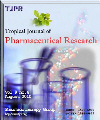
|
Tropical Journal of Pharmaceutical Research
Pharmacotherapy Group, Faculty of Pharmacy, University of Benin, Benin City, Nigeria
ISSN: 1596-5996
EISSN: 1596-5996
Vol. 14, No. 8, 2015, pp. 1509-1515
|
 Bioline Code: pr15198
Bioline Code: pr15198
Full paper language: English
Document type: Research Article
Document available free of charge
|
|
|
Tropical Journal of Pharmaceutical Research, Vol. 14, No. 8, 2015, pp. 1509-1515
| en |
Assessment of the Attitude of Community Pharmacists and Pharmacy Technicians towards Diarrhea: A Simulated Patient Study in Turkey
Sancar, Mesut; Tezcan, Elif; Okuyan, Betul & Izzettin, Fikret Vehbi
Abstract
Purpose:
To evaluate community pharmacists' and pharmacy technicians' counselling practices
regarding diarrhea in Istanbul-Turkey using a simulated patient study.
Methods:
This study was conducted in a total of one hundred community pharmacies located in two
different districts of Istanbul, Turkey. Diarrhea cases involving patients of different age groups were
designed and assigned to simulated patients who visited the pharmacies. After leaving a neighbourhood
pharmacy, the simulated patients answered a list of questions about the content of the consultation
services offered by the pharmacist or the pharmacy technician, including whether or not demographic
and medication history was taken, if pharmacological and non-pharmacological recommendations were
made, and if any patient education was offered. The duration of the counselling services, the total
number of questions asked by the community pharmacists and pharmacy technicians, and the cost of
the suggested medications were also evaluated.
Results:
The number of pharmacists and pharmacy technicians who counselled simulated patients was
40 and 60, respectively. Pharmacists and pharmacy technicians made little enquiry about the
demographics and medical history of the patients. The most common medications recommended by
pharmacists and pharmacy technicians were probiotics, either alone or in combination with other
medications. Pharmacists took more responsibility for simulated patients than pharmacy technicians did
(p < 0.05). Pharmacists offered more recommendations to simulated patients when compared with
pharmacy technicians (90 vs. 68.3 %, p < 0.05).
Conclusion:
In view of their consultant role regarding patient medication, the attitude of pharmacists
and pharmacy technicians towards minor illnesses such as diarrhea needs improvement through
professional education programs.
Keywords
Pharmacist; Pharmacy technician; Counselling practice; Simulated patient
|
| |
© Copyright 2015 - Tropical Journal of Pharmaceutical Research
Alternative site location: http://www.tjpr.org
|
|
